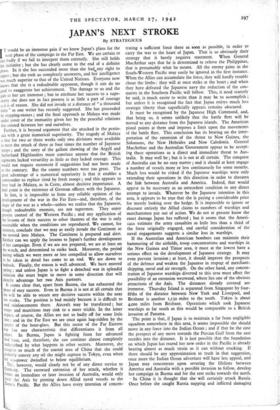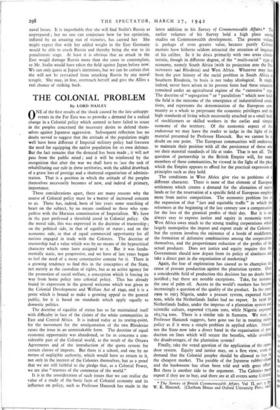JAPAN'S NEXT STROKE
By STRATEGICUS
T would be an immense gain if we knew Japan's plans for the I next phase of the campaign in the Far East. We are certain to fare badly if we fail to interpret them correctly. She still holds the initiative ; but she has clearly come to the end of a definite phase. In it she has succeeded more than she hadany right to expect ; but she took us completely unawares, and her intelligence was much superior to that of the United Nations. Everyone now knows that she is a redoubtable opponent, though it can do no good to exaggerate her achievement. The damage to us and the gain to her are immense ; but to attribute her success to a supe- riority she does not in fact possess is as little a part of courage as it is of reason. She did not invade at a distance of " a thousand miles " as one writer has recently suggested. She has proceeded by stepping-stones ; and the final approach to Malaya was made under cover of the immunity given her by the peaceful relations that existed between her and ourselves.
Further, it is beyond argument that she attacked in the penin- sula with a great numerical superiority. The tragedy of Malaya is that for two or three weeks only two divisions were available to meet the attack of three or four times the number of Japanese troops ; and the story of the gallant showing of the Argyll and Sutherland Highlanders must convince anyone that the British regiments lacked versatility as little as they lacked courage. This would not require statement if suggestions had not been made to the contrary. But the enemy numbers were too great. The great advantage of a numerical superiority is that it enables a commander to replace tired by fresh troops ; and this appears to have had in as in. Crete, almost decisive importance. A final point is the existence of German officers with the Japanese.
In fine, it is impossible to form any reliable opinion of the development of the war in the Far East—and, therefore, of the shape of the war as a whole—unless we realise that the Japanese, though redoubtable enemies, are not supermen. They enjoy present control of the Western Pacific ; and any application of the lessons of their success to other theatres of the war is only reasonable when the conditions are reproduced. We cannot, for instance, conclude that we may as easily invade the Continent as she moved into Malaya. The Continent is prepared and alert. Neither can we apply the lessons to Japan's further development of her campaign. Even if we are not prepared, we are at least on the watch, and determined to strike back. Moreover, the period during which we were more or less compelled to allow ourselves to be taken in detail has come to an end. We are down to bedrock. Finally, the season is well advanced. We have entered spring ; and unless Japan is to fight a detached war in splendid isolation she must begin to move in some direction that will directly advantage her two Axis partners.
It seems clear that, apart from Burma, she has exhausted the phase of easy success. Even in Burma it is not at all certain that she will be able to secure any decisive success within the next few weeks. The position is bad mainly because it is difficult to send reinforcements there. Aircraft may be transferred ; but troops and munitions may sink to a mere trickle. In the latter respect, of course, the Allies are not so badly off for some little tune and in the Far East we are once again hag-ridden by the spectre of the hour-glass. But this sector of the Far Eastern war has one characteristic that differentiates it from all ?tilers: In Burma, Japan is fighting from her advanced Land base, and, therefore,• she can continue almost completely undisturbed by what happens in other sectors. Moreover, she ozcupls so much of the coastal area of China that she could N'obably convey any oil she might capture to Tokyo, even when het sea-power dwindled to below equilibrium. Thi however, would dearly not be of any direct service to Germany. The eastward extension of her attack, whether it means an immediate or later invasion of Australia, would only dssIst the Axis by pinning down Allied naval vessels to the Eastern Pacific. But the Allies have every intention of concen-
trating a sufficient force there as soon as possible, in order to carry the war to the heart of Japan. That is so obviously their strategy that it barely requires statement. When General MacArthur says that he is determined to relieve the Philippines, that is presumably what he means. All the enemy gains in the South-Western Pacific may easily be ignored in the first instance. When the Allies can accumulate the force, they will hardly trouble about the limbs : they will at once strike at the heart ; and when they have defeated the Japanese navy the reduction of the con- quests in the Southern Pacific will follow. This, it need scarcely be said, is much easier to write than it may be to accomplish ; but unless it is recognised the fact that Japan enjoys much less strategic liberty than superficially appears remains obscured.
It must be recognised by the Japanese High Command, and, that being so, it seems unlikely that the battle fleet will be moved to any distance from the Japanese islands. The American pistol points at them and imposes a limit upon the movements of the battle fleet. This conclusion has its bearing on the inter- pretation of the- extension of the threat to New Guinea, the Solomons, the New Hebrides and New Caledonia. General MacArthur and the Australian Government appear to be accept- ing these operations as a direct and immediate threat to Aus- tralia. It may well be ; but it is not at all certain. The conquest of Australia can be no easy matter ; and it should at least engage a number of vessels more or less continuously for some months. Much less would be risked if the Japanese warships were only extending their operations in this direction in order to threaten the link between Australia and America. Indeed, that would appear to be necessary as an antecedent condition to any direct attempt to invade. Whatever be the Japanese intention in this area, it appears to be true that she is paying a considerable price for merely looking over the hedge. It is impossible to ignore or discount entirely the Allied claims to numbers of warships and merchantmen put out of action. We do not at present know the exact damage Japan has suffered ; but it seems that the Ameri- cans estimate the army casualties as little less than a third of the force originally engaged, and careful consideration of the naval engagements suggests a similar loss in warships.
If the Australian and American bombers can maintain their hammering of the airfields, troop concentrations and warships in the New Guinea and Timor area, it must at the lowest have a serious effect on the development of Japanese strategy. It may even prevent invasion ; at least, it should improve the prospects of the defence and weaken the Japanese in respect of merchant- shipping, naval and air strength. On the other hand, any concen- tration of Japanese warships diverted to this area must affect the possibility of an extension westward, where lies one of the obvious attractions of the Axis. The distances already covered are immense. Thursday Island is separated from Singapore by four- fifths of the distance between New York and Liverpool, and Brisbane is another 1,13o miles to the, south. Tokyo is about 4,000 miles from Brisbane. Operations which took Japanese warships as far south as this would be comparable to a British invasion of Panama.
The point is that, if Japan is to maintain a far from negligible squadron somewhere in this area, it seems impossible she should move in any force into the Indian Ocean ; and if that be the case the prospect of any move towards the Persian Gulf from the east recedes into the distance. It is just possible that the foundation on which Japan has reared her new order in the Pacific is already bearing almost as much strain as it can without cracking. If there should be any approximation to truth in that suggestion, once more the Indian Ocean adventure will have less appeal, and Japan may concentrate upon severing the lifelines between America and Australia with a possible invasion to follow, develop her campaign in Burma and for the rest strike towards the north.
• In China it is thought that she will certainly attack Russia. Once before she caught Russia napping and inflicted damaging naval losses. It is improbable that she will find Stalin's Russia as unprepared ; but no one can conjecture how far her optimism, inflated by an amazing run of victories, has carried her She might expect that with her added weight in the East Germany would be able to crush Russia and thereby bring the war to its penultimate stage. At least it is obvious that an attack in the East would damage Russia more than she cares to contemplate, or Mr. Stalin would have taken the field against Japan before now. We can only guess at Japan's intentions, but we can be certain that .she will not be restrained from attacking Russia by any moral scruple. She may, in fine, overreach herself and give the Allies a real chance of striking back.



























 Previous page
Previous page